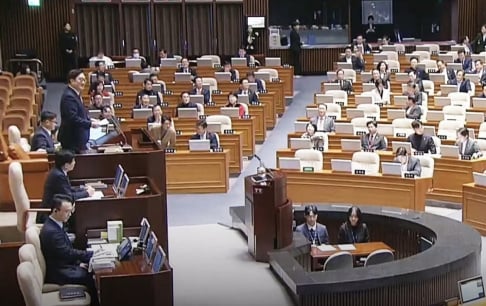SEE ALSO: Korea to revise standard trainee contracts to strengthen rights protections
If you don't know about Jeju Island, the island is the Southernmost island in Korea and a tourist destination that tourism service sector covers 75% of the industry structure. Jeju has a prestigious natural beauty and clean environment (Mt. Hallasan, tuff cone, lava tubes) and those are recognized by UNESCO with three titles including World Natural Heritage Site, Biosphere Reserve and Global Geopark. It attracts more than 15 million tourists (12 million Korean / 3 million foreign visitors) on an annual basis!
The 2nd Asian Infrastructure Investment Bank (AIIB) Annual General Meeting will take place from June 16th to June 18th at the Jeju International Convention Center. The meeting will handle supporting the founding of social overhead capital and run under the topic of 'sustainable infrastructures.'
Believe it or not, this general meeting is the first meeting outside of China since its first launch in Beijing. Over 2,000 people, including the Minister of Finance, the governor of the central bank, representatives from international organizations, and businessmen and entrepreneurs from 80 different countries are planning to attend.
There will not only be official events, but also places of communication such as developing country investment forums, infrastructure seminars, one-on-one business meetings, and Korean infrastructure business explanations!
As a unit event, Jeju Island will announce the 'Island Without Carbon' project and spread its value as a global eco-platform, and provide a chance to meet world natural heritage sites through tour programs - something any wanderlust fan would love to explore!
Aside from taking a huge economic leap in the right direction, nationally, Korea will have to strengthen its economic network, build a strategic investment attraction for medium and long-term infrastructure industries, and build bridge for Korean industries to expand overseas through the AIIB Annual General Meeting.bridge for Korean industries to expand overseas through the AIIB Annual General Meeting.
Designation of Jeju Free International City
Jeju Province was designated as a Free International City in April. 2002 by Korean Government to foster it as a Hub of Northeast Asia. Since this designation, Jeju is exclusively conducting its own special policies such as Jeju Investment Promotion Zone (tax incentives for investors), visa waiver for 180 countries, DFS for domestic travelers etc.
Launch of Jeju Special Self-Governing Province
On July 1st, 2006, Jeju Special Self-Governing Province was launched by coordinating with Korean Government and it allows Jeju to do the high class of autonomous rights.
A wide variety of authorities have been transferred to Jeju Special Self-Governing Province from Korean Central Government except for national defense, foreign affairs, and administrative jurisdiction areas.
Achievement of Jeju Special Self-Governing Province.
Since the launch of Jeju Special Self-Governing Province, Jeju has attracted more than 15 billion USD of FDI: Foreign Direct Investment including Myth & History Theme Park, Healthcare Town projects. Jeju High-Tech Science Park was completed by inviting numerous high quality IT companies such as Daum?Kakao (one of the best internet portal site companies in Korea) and the 2nd Science Park is in progress. Jeju Global Education City has been also established by attracting 3 international schools including NLCS: North London Collegiate School, BHA: Branksome Hall Asia, KIS: Korean International School and even another international school is scheduled to be open during this year.
2030 Carbon Neutral Island, Jeju
Since the huge growth of economic size and tourism sector, Jeju is now ambitiously set up a new vision, 2030 Carbon Free Island project. It is a great policy to make Jeju carbon neutral island by converting 100% of electric vehicles, 100% electricity generation from renewable energy. Jeju will be a Northeast Asia Hub by promoting low carbon and green growth.
*This article has been sponsored by JEJU TOURISM ORGANIZATION





 SHARE
SHARE














































Great initiative! I have heard that China is the leader in renewable energy consumption. The Chinese minister predicts that in the near future they will be able to completely switch to renewable energy sources. In this regard, many programs have appeared like , which help to improve and simplify workflows in field work.